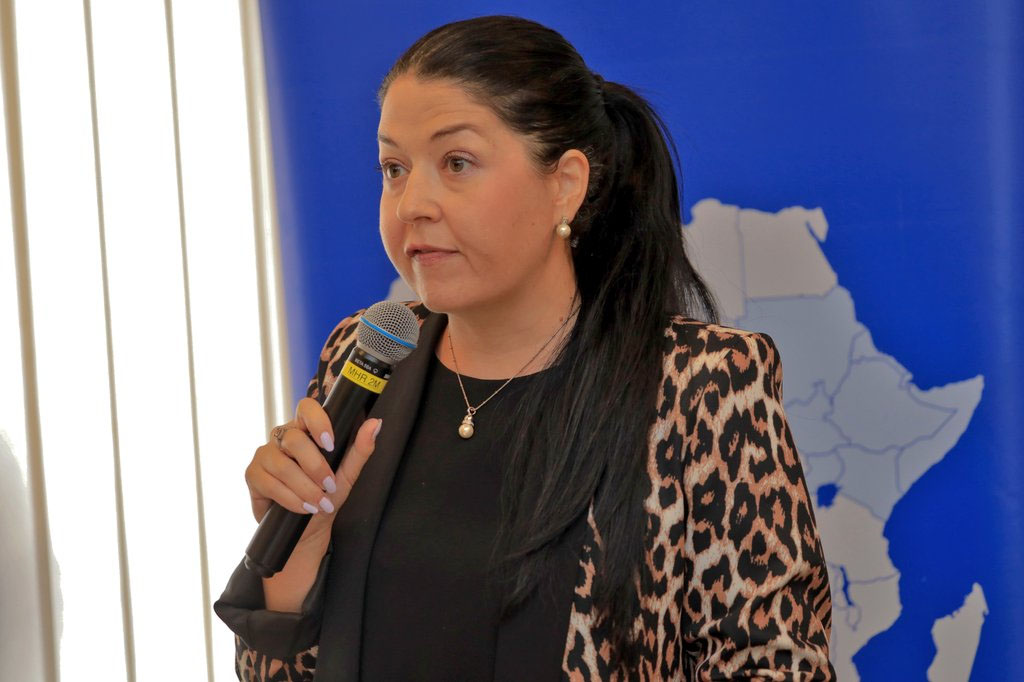Police launch guidelines to strengthen human trafficking investigations
Speaking at the endorsement ceremony at Mestil Hotel in Kampala on August 19, 2025, acting director of forensic services Andrew Mubiru described the new guidelines as a milestone in Uganda’s efforts to combat one of the world’s gravest crimes.
Speaking at the endorsement ceremony at Mestil Hotel in Kampala on August 19, 2025, acting director of forensic services Andrew Mubiru described the new guidelines as a milestone. (Credit: Police)
___________________
Police have unveiled new standard operating procedures (SOPs) for crime scene examination in trafficking in persons investigations, a tool officials say will strengthen the fight against human trafficking by ensuring professional handling of crime scenes and stronger evidence for prosecution.
Speaking at the endorsement ceremony at Mestil Hotel in Kampala on August 19, 2025, acting director of forensic services Andrew Mubiru described the new guidelines as a milestone in Uganda’s efforts to combat one of the world’s gravest crimes.
“Trafficking in persons is real and present in our communities. Many survivors remain unseen, trapped in silence and fear. The lives of children, women, and men have been devastated, with their dignity and future stolen,” Mubiru said.
He emphasised that mishandling crime scenes undermines justice and emboldens traffickers. “In every case of trafficking, the crime scene is where the truth begins to emerge. It may be a hidden house, a border crossing, a vehicle, or even a digital environment. Mishandling scenes or losing evidence helps traffickers, harms victims, and undermines justice,” he noted.
According to Mubiru, the new SOPs provide clear, practical and standardised procedures for officers and first responders to secure, document, and examine crime scenes specific to human trafficking cases. He said the guidelines will help minimise re-traumatisation of survivors, reduce the need for repeated testimony, and ensure evidence speaks on their behalf.
“These SOPs are not suggestions; they are operational standards. Supervisors must ensure they are consistently applied,” Mubiru stressed, adding that training, compliance, monitoring, and adaptation to new trafficking methods will be key to their success.
Mubiru also highlighted the collaboration that went into developing the SOPs, acknowledging the contribution of the Office of the Director of Public Prosecutions, various Police Directorates, and international partners, including CIVIPOL, GIZ, the European Union, the German Federal Ministry for Economic Cooperation and Development, UN Women, IDLO, and UNFPA.
“These SOPs fit into a larger strategy,” Mubiru said. “They complement existing frameworks to bring forensic precision to the earliest stages of an investigation and align with our broader Scenes of Crime Management Manual. By tailoring procedures specifically for trafficking cases, we are ensuring that the fight against trafficking in persons is met with precise practices that are fit for purpose.”
He urged officers to commit to making the SOPs “a living standard—not words on paper, but actions in the field.”
Gravest violations
Also speaking at the ceremony, Dr Katja Yvonne Kerschbumer, head of the Austrian Embassy Development Co-operation, described human trafficking as “one of the gravest violations of human dignity in our time.”
Dr Katja Yvonne Kerschbumer, head of the Austrian Embassy Development Co-operation, speaking during the endorsement ceremony at Mestil Hotel in Kampala. (Credit: Police)
“It strips people of their freedom, exploits their vulnerability, and treats human beings as commodities,” Kerschbumer said. “The fight against human trafficking is not optional—it is a moral and legal imperative. To remain silent or inactive in the face of such abuse would mean tolerating modern slavery within our societies.”
She stressed that trafficking is not only a human rights issue but also a justice issue, pointing out that survivors often remain invisible because they are too traumatised, marginalised, or afraid to seek redress.
“Without access to justice, trafficked persons remain invisible: unable to reclaim their rights, unable to hold perpetrators accountable, and unable to rebuild their lives. Ensuring access to justice means ensuring that survivors are heard, protected, and empowered,” she said.
Kerschbumer also underscored the importance of high-quality evidence in securing convictions. “Human trafficking cases are complex: perpetrators are often organised, crimes are hidden, and victims may be too traumatised or afraid to testify.
This makes it essential to gather strong evidence—digital records, financial trails, travel documents, forensic data, and credible witness statements,” she explained.
Such evidence, she added, not only strengthens prosecution but also shields victims from repeated questioning and hostile courtroom confrontations.
The Austrian envoy stressed that tackling trafficking is not a challenge one institution or country can face alone.
“It requires collective action, coordination, and a shared commitment to place the dignity and rights of victims at the centre of our efforts,” she said, noting that development partners remain committed to supporting Uganda’s efforts.
She further linked the fight against trafficking to national development. “Trafficking robs a country of its most valuable resource—its people. It undermines labour markets, fuels corruption, and erodes trust in institutions. A society where people are exploited cannot flourish,” she said.
She added that: “By combating human trafficking, we strengthen the rule of law, promote social cohesion, and safeguard the human capital essential for sustainable development.”